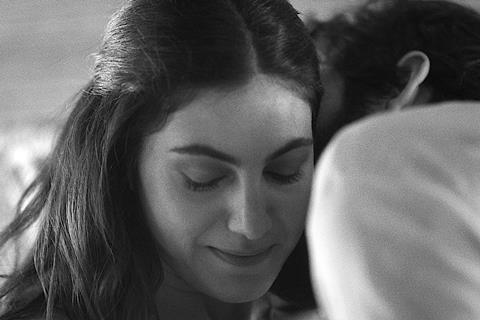A brother and sister depart 1940s Lebanon for a new life in Brazil in the latest from Marcelo Gomes

Dir: Marcelo Gomes. Brazil/Italy/Lebanon. 2024. 92mins
Lebanon, at the turbulent tale-end of the 1940s. A Catholic brother and sister, Emir (Zakaria Al Kaakour) and Emilie (Wafa’a Celine Halawi) decide to flee the country that has already claimed the lives of their parents and seek a fresh start in Brazil. But while Emilie is open to the possibilities of her new life, Emir is paralysed by violent jealousy, suspicion and a dark core of hatred. The eighth film from Brazilian director Marcelo Gomes is a handsome black-and-white parable that makes the persuasive, if rather blunt, case that there is no viable future when religious and cultural intolerance consumes society.
A handsome black and white parable
The Rotterdam world premiere of this adaptation of a novel by Brazilian author Milton Hatoum arrives in an arthouse cinema landscape which is not under-served by stories of migration. Yet this is a distinctive and atmospheric addition to the genre that explores the strong historical ties between Lebanon and Brazil with an almost mythic quality to its storytelling. It should prove to be a title of interest for further film festivals.
The black and white element of the film extends beyond the arresting photography. There is a contrasting yin and yang quality to the brother and sister characters; the charismatic and beautiful is Emilie open, engaged and forging connections with her fellow passengers, while Emir is hostile and shut away from the rest of the ship (he managed to sneak on board without a ticket but must stay hidden in their cabin for fear of discovery). To complicate matters, he is nursing what appears to be an incestuous crush on his sister.
In addition to a burgeoning love affair with Omar (Charbel Kamel), a Muslim merchant from Tripoli, Emilie strikes up a close friendship with an indigenous woman, Lara (Rosa Peixoto). Emir, meanwhile, is fascinated by the work of a photographer (Eros Galbiati) who is documenting the journey, but the core of bitterness triggered by his sister’s relationship prevents him from pursuing his own dreams. A violent flare-up of tensions on the boat results in an accidental shooting; brother and sister, along with Lara and Omar, are forced to disembark and travel to Lara’s traditional Amazon village for life-saving treatment for the gunshot victim.
This is a striking-looking picture from Gomes, who returns to Rotterdam after his Hubert Bals Fund-supported feature debut Cinema, Aspirins And Vultures screened at IFFR in 2006, having first premiered in Cannes Un Certain Regard in 2005. (His other pictures include Joaquim, which played in Berlin competition 2015, and I Travel Because I Have To, I Come Back Because I Love You, co-directed with Karim Ainouz, which premiered in Venice.)
Here, the tight, boxy aspect ratio evoking the cell-like ship’s cabins, and Pierre de Kerchove’s cinematography capturing a frame that is carved up by slicing blades of light and the intricate weave of hammocks strung below decks. And Gomes shows the boat as a microcosm of the rich cultural melting pot of mid-20th century Brazil, with a collage of religious rituals and prayers layered over each other. Enlightenment comes in many forms.
Ultimately, however, the picture, with its full-blooded sensuality and passion, its frame teaming with fecund foliage and wildlife, captures Brazil’s embrace and sense of possibility more effectively than it does the complex motives of the migrants who find safety on its shores.
Production company: Matizar Filmes, Gullane Filmes, Misti Filmes, Bubbles Project, Muiraquitã Filmes, Kavac Film
International sales: O2 Play atendimento@o2play.com
Producers: Mariana Ferraz, Ernesto Soto, Fabiano Gullane, Eliane Ferreira, Guilherme Coelho, Tatiana Leite, Simone Gattoni
Screenplay: Marcelo Gomes, Gustavo Campos, Maria Camargo
Cinematography: Pierre de Kerchove
Editing: Karen Harley
Production design: Marcos Pedroso, Caterina Pepe
Music: Mateus Alves, Piero Bianchi, Sami Bordokan
Main cast: Wafa’a Celine Halawi, Charbel Kamel, Zakaria Al Kaakour, Eros Galbiati, Rosa Peixoto

























No comments yet